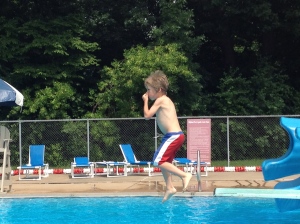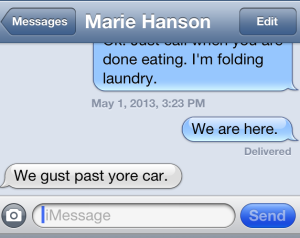The marathon is 9 days away. I have reached rest week. Now I sit, sleep and eat for a week and get filled with nerves and questions of “What have I gotten myself into?” Long runs are done. Hill drills are done. Track workouts, tempo runs, pace runs, long mid-week runs….all done. The workout routine that I have come to love and rely on over the last year will take a break for awhile. My overall goal has been achieved, which was to make it through a year with no major injury. I have successfully come back from my major stress fracture and completing my second marathon, no matter my time, will be the icing on the cake. On my last fast run this morning one of my running partners asked how I felt my summer marathon training had gone. I commented that I could tell I had spent all winter and spring working incredibly hard to gain strength and endurance. Last fall I worked hard to relearn how to run with my very condensed stride. I had to concentrate on every step I took so I didn’t slip into my old habits. During my marathon training this summer I never felt as tired as I felt last winter when I was doing yoga, skate skiing, running through snow drifts and forcing my body to do things I never thought possible for me.
#2 has also come back from an injury. Both of us were crushed by his school experience, never knowing if he would re-enter a school after basically being told “we don’t know how to teach you and we don’t want to figure it out.” At my last meeting with the staff the defining moment came when they told me they didn’t believe it was possible for him to read and write (he was only in 3rd grade at the time). #2 was so downtrodden that he also never believed he would read or write.
We have worked for 1 1/2 years to build up his strength and confidence and prove his former school (and himself) wrong. I worked long and hard teaching him how to read and write….and most importantly how to believe in himself again. We started at the beginning, going over the letters and their sounds. We worked longer and harder on basic reading, writing and math skills than I ever thought was possible. He wrote paragraph after paragraph working on his form, spelling and trying to get faster and more automatic. He read book after book out loud working on his decoding strategies, comprehension and reading fluency.
Near the end of the summer I decided it was time to send him into the world. Because of all his work, his basic skills are much stronger than I thought was possible a couple years ago. He can decode a word, understands how English works and can discuss what he has read. The overall goals of homeschooling were met. He learned to read at grade level, believes he is a reader, has the confidence and ability to express himself in written form, and is able to get spelling close enough for a spellcheck to help him…most of the time. His work on the basic skills was done and it was time to apply them in a less controlled environment and work on some new goals, so I enrolled him in school. He now attends Cyber Village Academy, a small charter school close to our house. Like all the students on campus, he is at school 3 days a week and at home 2, which seems the perfect blend of homeschooling and traditional school. Much of the reading and writing take place at home, on a computer. We still tap out syllables for spelling, remind him about the -ed suffix, and I modify the work that isn’t appropriate for him. I have had his first IEP meeting and they are working on his main goal of self-advocacy at school, a goal that is pretty difficult when your mother slightly stubborn mother is your only teacher.
The week before I sent him off to school we had a rest week at home. I was filled with anxiety. Would he be able to do this? Has he prepared well? Should I have drilled him more on vowel-consonant-e? Will he be able to keep up?
It was time for me to trust again and rely on the work we have done. Trust myself. Trust the school. Trust the teachers. And, trust #2.
#2, Are you ready for this? It’s going to be hard. There will be times when you want to quit. You will need to constantly remind yourself that you have worked hard for this moment and you want to be here, especially when its hard. I will be here to help you and encourage you, but its you that will need to do all the hard work.
His response….
Yes. I’m ready.
I worked hard and I know I can do this.
Let me prove what I know.
I’m ready to show them what I’ve got.
Now can you PLEASE TAKE THE PICTURE SO WE CAN GET GOING?
And with that, he was off.
In 9 days I will also be doing something not because it is easy, but because it is hard. I never thought I’d be a runner, but here I am proving myself wrong because of the work I have done, the self-discipline I have learn and the support I have received. There will surely be moments during the 26.2 when I will want to quit. But, there will be smiling faces and words of encouragement along the way telling me I can do this, rely on the work I’ve done for the past year, and remember to trust my body.
It’s time for me to show myself what I’ve got.














